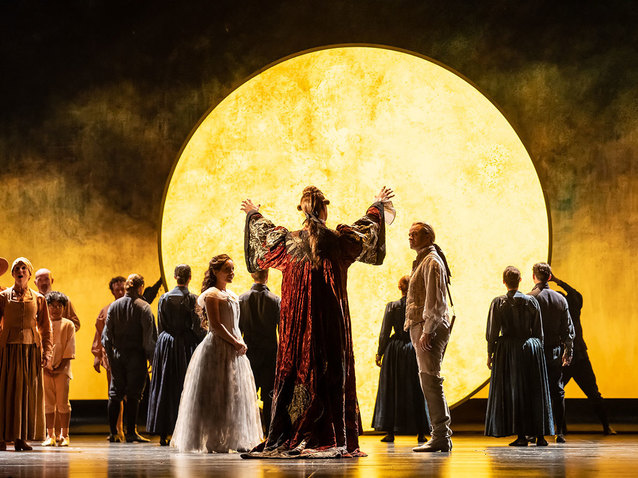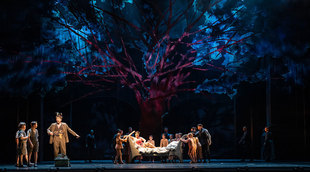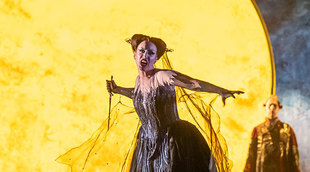 © The Magic Flute (c) ROH 2021, photo by Bill Cooper
© The Magic Flute (c) ROH 2021, photo by Bill Cooper
Sir David McVicar’s 2001 production of Rigoletto for the Royal Opera may just have been displaced by a new version by Oliver Mears, but his The Magic Flute of 2003 is still going strong. Mozart’s final opera, which premiered on 30 September 1791 just a few months before the composer’s death, takes the form of a Singspiel that combines singing with spoken dialogue. In it, the Queen of the Night persuades Prince Tamino to rescue her daughter Pamina from captivity under the high priest Sarastro, who she claims is evil. As Tamino goes about his quest, however, and falls in love with Pamina, he learns that things are the other way around. The Queen of the Night represents the forces of darkness, while Sarastro’s community stands for high ideals and enlightened values, leading Tamino to seek to join it. As a result, he and Pamina, separately and then together, undergo a series of trials of initiation. These are focused less on revealing brute strength than moral resolve and mental courage, and end in triumph as the Queen and her cohort are vanquished. Some comedy is also introduced in the form of the bird catcher, Papageno, who accompanies Tamino on his quest and fails the trials completely, though he is rewarded anyway with the hand of his ideal female companion Papagena.
Mozart and his librettist, Emanuel Schikaneder, were both Freemasons. This not only explains the work’s Masonic elements and Enlightenment philosophy, but also why it has never been the easiest piece to stage since it is, in the words of Sarah Lenton, a ‘jumble of farce and sublimity’. In nineteenth century Germany it became caught between the advocates of Italian and Romantic opera, and bridging the gap between its fun and religious elements, its obvious magic and deeper symbolism, has remained difficult to this day.
If, however, doing full justice to one or more of the piece’s elements risks sacrificing something of the others, McVicar’s production, revived here by Daniel Dooner, goes a considerable way towards squaring the circle. It does this by offering a frequently quiet staging that nonetheless allows each of the opera’s disparate elements to breathe uninhibited. It keeps the humorous aspects under control while allowing the emotional and symbolic elements to speak, unimpeded by an overly lavish set-up.
The production certainly has its sillier moments as the curtain rises on a dopey looking serpent, and Papageno’s entrance is accompanied by a bird pushed along on wheels who proceeds to outwit the bird catcher, at least during ‘Der Vogelfänger bin ich ja’ itself. It is far better, however, to pass these props off as ironic in their humour than to risk falling flat on one’s face by trying to make them more serious. Elsewhere, the staging has a pleasing understated quality. The Temple of Wisdom, in which the Speaker appears, finds enough to draw the eye with just a few celestial instruments and figures, while the Queen of the Night appears against a backdrop of constellations in the sky. John Macfarlane’s set, coolly yet brilliantly lit by Paule Constable, sees deliberately ill proportioned columns run down both sides of the stage, which give the resulting structure a post-modern feel. These can be relatively compressed to suggest an overbearing, enclosed space, or opened out to create a far larger area.

The Magic Flute (c) ROH 2021, photo by Bill Cooper

The Magic Flute (c) ROH 2021, photo by Bill Cooper
The production includes a relatively large group of actors who move between playing humans, animals, puppeteers and props. They operate the serpent at the start and also hand the staging a touch of the Brechtian by making, for example, the removal of a couch at the end of Sarastro’s ‘In diesen heil’gen Hallen’ an integral part of the drama. In a similar vein, when the Queen of the Night sings ‘O zittre nicht, mein lieber Sohn’ the Ladies are joined in swaying around her by three further veiled figures who help to accentuate her presence. The actors also give the animals they play during ‘Wie stark ist nicht dein Zauberton’ human traits as warthogs carry walking sticks and birds walk on stilts. All this is in keeping with the fact that the opera premiered not at Vienna’s Burgtheater, but at the librettist Schikaneder’s own Freihaus-Theater auf der Wieden, where by November 1792 it had already notched up a hundred performances. This venue was as famed for its fairytales and comedies as its Goethe, and the original production included sixteen set changes as well as real lions, monkeys and serpents.
This does not mean that there are no moments that miss the mark as the journeys through fire and water feel a little lame as they merely see the actors writhing and swaying. In addition, amusing though it is to see the two Priests (‘old hands’ Harry Nicoll and Donald Maxwell on typically good form) involuntarily jiving to Papageno’s ‘Ein Mädchen oder Weibchen’, the spectacle detracts from us really engaging with Papageno’s sorrow, and seems too small for the Royal Opera House stage. It might have been better either to have let Papageno sing the aria totally unimpeded, or to have injected it with far more activity.
Hartmut Haenchen’s conducting is excellent as he makes the score feel pithy while still bringing a real sense of lyricism to it. Richard Hetherington conducts for three of the later performances, while two casts perform over the run. On the occasion I attended, there was no weak player with performances ranging from good to outstanding. Brenda Rae is a tremendous Queen of the Night, with her formidable and alluring presence being complemented by the most delicate coloratura in ‘Der Hölle Rache’ as if it stands as an eye at the centre of the storm. Christina Gansch is an extremely strong Tamina, with the resonance and nuance in her sound, and the precision in her phrasing, being particularly striking. James Platt also proves a first rate Sarastro as he delivers his deep bass notes in staggering fashion. Daniel Behle reveals a highly pleasing tenor as Tamino, Peter Kellner produces a notably clear and persuasive sound as Papageno, while there is excellent support from Peter Hoare as Monostatos, David Soar as the Speaker of the Temple and Alexandra Lowe as Papagena. The other cast includes Bernard Richter as Tamino, Salome Jicia as Pamina, Huw Montague Rendall as Papageno and Krzysztof Baczyk as Sarastro.
by Sam Smith
The Magic Flute | 15 September - 7 October 2021 | Royal Opera House, Covent Garden
the 20 of September, 2021 | Print

Comments